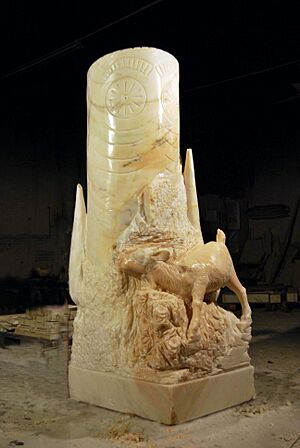Ataegina facts for kids
Ataegina (also spelled Spanish: Ataecina or Portuguese: Atégina) was an ancient goddess. People in the Iberian Peninsula worshipped her long ago. These groups included the Iberians, Lusitanians, and Celtiberians. Many believed she was the ruler of the underworld, which is a mythical place where spirits go after death.
Contents
What Her Name Means
Historians and language experts have different ideas about where the name Ataegina comes from. Some think it comes from a Celtic word. They suggest it might mean 'The Reborn One'. This idea connects her to things like spring and new life.
Other experts believe her name might be linked to the word for 'night'. This would fit with the idea of her being a goddess of the underworld. However, because she was also worshipped by non-Celtic groups, some think her name might come from an even older local language.
Where She Was Worshipped
Ataegina was worshipped in many places across what is now Portugal and Spain. People built special places for her in areas like Lusitania and Betica.
Some important places where she was worshipped include:
- Elvas in Portugal.
- Mérida and Cáceres in Spain.
- Areas near the Guadiana river.
- Ancient cities like Myrtilis (now Mértola, Portugal) and Pax Julia (now Beja, Portugal).
An old bronze plaque found in Malpartida de Cáceres shows that the goat was a sacred animal linked to Ataegina.
Turibriga: A Special Place
Sometimes, her name appears with the word Turobrigensis. This suggests there was a main center for her worship called Turibriga or Turobriga. We don't know exactly where this place was. However, ancient writers like Pliny mentioned it was in a region called Celtic Beturia.
What She Did as a Goddess
Ataegina was often linked to the Roman goddess Proserpina. Proserpina was known as a goddess of spring and the underworld. This connection suggests Ataegina also had power over these things.
For example, an old stone carving found in Augusta Emérita shows someone praying to Ataegina. They ask her to help them get back some stolen clothes. This shows people believed she could help with justice and protecting what was theirs.
See also
 In Spanish: Ataecina para niños
In Spanish: Ataecina para niños
 | Selma Burke |
 | Pauline Powell Burns |
 | Frederick J. Brown |
 | Robert Blackburn |


